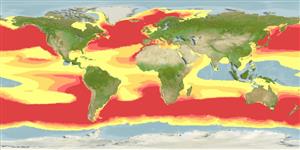Teleostei (teleosts) >
Aulopiformes (Grinners) >
Paralepididae (Barracudinas)
Etymology: Arctozenus: Greek, arktos = bear + particle zen, derived from zao = to give life; risso: Named after A. Risso, European ichthyologist (Ref. 6885).
More on author: Bonaparte.
Issue
Genus and spelling of species Eschmeyer, pers. comm. and in Paxton et al. 1989 (Ref.7300:247).
Environment: milieu / climate zone / depth range / distribution range
Ecology
Marine; bathypelagic; depth range 0 - 2200 m (Ref. 50610). Deep-water; 71°N - 55°S, 180°W - 180°E
Worldwide distribution from the Arctic to Antarctic. Eastern Pacific: British Columbia (55°N) to at least north central Baja California (28°N) (Ref. 35950). Northwest Pacific: Bering Sea, Kamchatka, Kuril Islands (Ref. 41668).
Size / Weight / Age
Maturity: Lm ? range ? - ? cm
Max length : 30.0 cm SL male/unsexed; (Ref. 35388); common length : 25.0 cm SL male/unsexed; (Ref. 4473)
Pseudoceanic and mesopelagic, occurring singly or in small schools (Ref. 5759), primarily at 200-1000 (Ref. 58302). Feed mainly on fishes and shrimps (Ref. 5759). Spawn in continental slopes and in oceanic banks from northern through tropical to southern temperate waters. Oviparous, with planktonic larvae (Ref. 35950).
Life cycle and mating behavior
Maturities | Reproduction | Spawnings | Egg(s) | Fecundities | Larvae
Post, A., 1990. Paralepididae. p. 373-384. In J.C. Quero, J.C. Hureau, C. Karrer, A. Post and L. Saldanha (eds.) Check-list of the fishes of the eastern tropical Atlantic (CLOFETA). JNICT, Lisbon; SEI, Paris; and UNESCO, Paris. Vol. 1. (Ref. 4473)
IUCN Red List Status (Ref. 130435)
Threat to humans
Harmless
Human uses
Fisheries: of no interest
Tools
Special reports
Download XML
Internet sources
Estimates based on models
Preferred temperature (Ref.
123201): 0.8 - 10.8, mean 4.1 °C (based on 2120 cells).
Phylogenetic diversity index (Ref.
82804): PD
50 = 1.0000 [Uniqueness, from 0.5 = low to 2.0 = high].
Bayesian length-weight: a=0.00224 (0.00090 - 0.00555), b=3.14 (2.92 - 3.36), in cm total length, based on LWR estimates for this (Sub)family-body shape (Ref.
93245).
Trophic level (Ref.
69278): 3.2 ±0.0 se; based on diet studies.
Fishing Vulnerability (Ref.
59153): Low to moderate vulnerability (27 of 100).
Nutrients (Ref.
124155): Calcium = 49.9 [16.8, 160.1] mg/100g; Iron = 0.548 [0.182, 1.750] mg/100g; Protein = 15.6 [12.5, 18.2] %; Omega3 = 0.105 [0.029, 0.325] g/100g; Selenium = 27.5 [7.9, 78.4] μg/100g; VitaminA = 14.2 [1.6, 119.9] μg/100g; Zinc = 0.615 [0.321, 1.262] mg/100g (wet weight);
